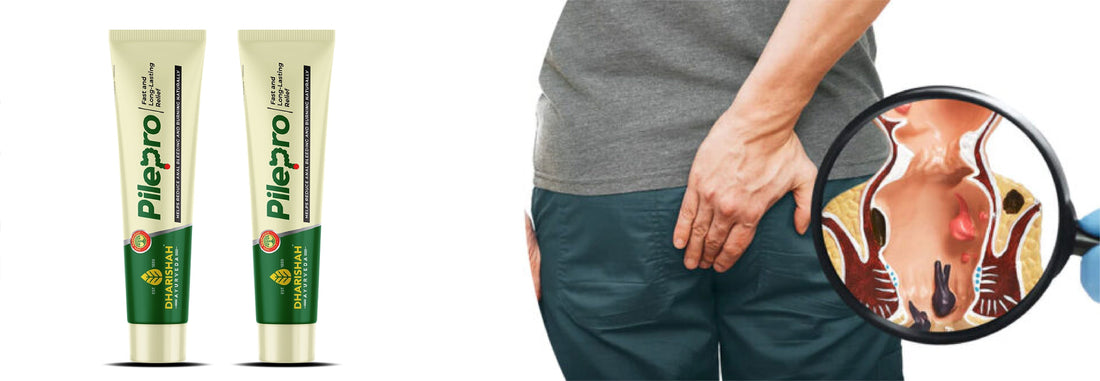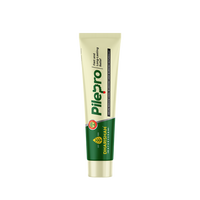Hemorrhoid Pain: Causes, Symptoms, and Natural Relief Techniques
Introduction: The Painful Reality of Piles
Hemorrhoids, commonly known as piles, can be an extremely uncomfortable and painful condition. If you've ever asked yourself, "Why is my piles so painful?" you're not alone. Millions of people worldwide suffer from this condition, which can significantly impact daily life. In this comprehensive guide, we'll explore the reasons behind painful piles, discuss effective management strategies, and introduce you to natural solutions like PilePro Ointment from Dharishah Ayurveda.
Understanding Hemorrhoids: Types and Causes
Before delving into why piles can be so painful, it's essential to understand what hemorrhoids are and their different types:
-
Internal Hemorrhoids: These occur inside the rectum and are usually painless unless they prolapse or become very large.
-
External Hemorrhoids: These form under the skin around the anus and can be more painful, especially when they thrombose (form blood clots).
-
Thrombosed Hemorrhoids: These are external hemorrhoids that have developed blood clots, causing severe pain and swelling.
Common causes of hemorrhoids include:
-
Chronic constipation or diarrhea
-
Straining during bowel movements
-
Sitting for long periods, especially on the toilet
-
Lack of fiber in the diet
-
Pregnancy and childbirth
-
Obesity
-
Heavy lifting
Understanding the type and cause of your hemorrhoids is crucial in addressing the pain and discomfort effectively.
Why Piles Become Painful: Triggers and Factors
Piles can become painful due to various reasons:
-
Inflammation: When hemorrhoids swell, they can become inflamed, leading to pain and discomfort.
-
Pressure: Increased pressure in the anal area, often due to straining or prolonged sitting, can cause pain.
-
Thrombosis: When external hemorrhoids develop blood clots, they can become extremely painful.
-
Prolapse: Internal hemorrhoids that protrude outside the anus can cause significant discomfort.
-
Irritation: Frequent wiping or cleaning of the anal area can irritate hemorrhoids, making them more painful.
-
Infection: In some cases, hemorrhoids can become infected, leading to increased pain and complications.
-
Anal Fissures: These small tears in the lining of the anus often accompany hemorrhoids and can cause sharp pain during bowel movements.
Understanding these factors can help you identify the source of your pain and take appropriate measures to alleviate it.
Symptoms of Painful Hemorrhoids
Painful hemorrhoids often present with the following symptoms:
-
Sharp pain or discomfort around the anus
-
Itching and irritation in the anal area
-
Swelling around the anus
-
Bleeding during bowel movements
-
A lump or bulge near the anus
-
Difficulty sitting comfortably
-
Pain that worsens when passing stool
If you experience these symptoms, it's important to address them promptly to prevent further discomfort and potential complications.
Diagnosing Painful Piles: When to See a Doctor
While many cases of hemorrhoids can be managed at home, there are instances when professional medical advice is necessary. Consider seeing a doctor if:
-
Your symptoms persist for more than a week despite home treatments
-
You experience severe pain or excessive bleeding
-
You notice a significant change in bowel habits
-
You develop fever or signs of infection
-
You're unsure whether your symptoms are caused by hemorrhoids or another condition
A healthcare professional can provide a proper diagnosis and recommend appropriate treatment options based on the severity of your condition.
Natural Remedies for Hemorrhoid Pain Relief
Several natural remedies can help alleviate the pain associated with hemorrhoids:
-
Sitz Baths: Soaking the affected area in warm water for 10-15 minutes, several times a day, can reduce pain and inflammation.
-
Ice Packs: Applying cold compresses to the anal area can help numb the pain and reduce swelling.
-
Witch Hazel: This natural astringent can help soothe irritation and reduce bleeding when applied topically.
-
Aloe Vera: Known for its anti-inflammatory properties, aloe vera gel can provide relief when applied to the affected area.
-
Psyllium Husk: This natural fiber supplement can help soften stools and reduce straining during bowel movements.
-
Coconut Oil: Its antimicrobial and anti-inflammatory properties can help soothe painful hemorrhoids when applied topically.
-
Essential Oils: Certain essential oils like lavender or tea tree oil, when diluted properly, can help reduce pain and inflammation.
These natural remedies can be effective for mild to moderate hemorrhoid pain. However, for persistent or severe cases, it's advisable to seek professional medical advice.
Ayurvedic Approach to Managing Painful Piles
Ayurveda, the ancient Indian system of medicine, offers a holistic approach to managing hemorrhoids. According to Ayurveda, piles are often caused by an imbalance in the Vata and Pitta doshas. Here are some Ayurvedic remedies that can help:
-
Triphala: This herbal blend of three fruits is known for its laxative properties and can help regulate bowel movements.
-
Abhyanga: Regular oil massage of the anal area with medicated oils can help improve circulation and reduce pain.
-
Herbal Supplements: Ayurvedic herbs like Haritaki, Amalaki, and Bibhitaki are known for their benefits in managing hemorrhoids.
-
Diet Modifications: Ayurveda recommends a diet rich in fiber and avoiding spicy, oily, and processed foods to manage piles.
-
Yoga and Pranayama: Certain yoga poses and breathing exercises can help improve digestion and reduce the pressure on hemorrhoids.
Dharishah Ayurveda incorporates these traditional Ayurvedic principles in its approach to hemorrhoid management, offering natural and effective solutions like PilePro Ointment.
Lifestyle Changes to Reduce Hemorrhoid Pain
Making certain lifestyle changes can significantly reduce the pain associated with hemorrhoids:
-
Improve Bathroom Habits: Avoid straining during bowel movements and limit the time spent on the toilet.
-
Stay Active: Regular exercise can help improve circulation and prevent constipation.
-
Maintain Good Hygiene: Keep the anal area clean and dry to prevent irritation and infection.
-
Wear Loose Clothing: Tight clothing can increase pressure and irritation in the anal area.
-
Manage Stress: Stress can exacerbate hemorrhoid symptoms, so practice stress-reduction techniques like meditation or deep breathing.
-
Stay Hydrated: Drinking plenty of water can help prevent constipation and soften stools.
-
Avoid Heavy Lifting: If possible, avoid lifting heavy objects, which can increase pressure on hemorrhoids.
Implementing these changes can not only help manage current symptoms but also prevent future flare-ups.
Dietary Modifications for Hemorrhoid Management
Diet plays a crucial role in managing hemorrhoids and reducing associated pain. Consider the following dietary modifications:
-
Increase Fiber Intake: Consume more fruits, vegetables, whole grains, and legumes to soften stools and ease bowel movements.
-
Stay Hydrated: Drink at least 8 glasses of water daily to prevent constipation.
-
Limit Spicy and Processed Foods: These can irritate the digestive system and exacerbate hemorrhoid symptoms.
-
Include Probiotic Foods: Yogurt, kefir, and other fermented foods can improve gut health and regulate bowel movements.
-
Eat More Omega-3 Fatty Acids: Found in fish, flaxseeds, and chia seeds, these can help reduce inflammation.
-
Avoid Alcohol and Caffeine: These can dehydrate the body and potentially worsen constipation.
-
Consider Herbal Teas: Certain herbal teas like chamomile or ginger can help soothe the digestive system.
A balanced diet not only helps manage hemorrhoid pain but also promotes overall digestive health.
PilePro Ointment: A Natural Solution for Painful Piles

PilePro Ointment an ayurvedic ointment for piles from Dharishah Ayurveda is a specially formulated natural solution for painful piles. This Ayurvedic ointment combines traditional herbs known for their effectiveness in managing hemorrhoid symptoms:
-
Jatyadi Tail: Known for its wound-healing and anti-inflammatory properties.
-
Neem: Offers antimicrobial and anti-inflammatory benefits.
-
Haridra: Helps reduce inflammation and promote healing.
-
Daruharidra: Known for its astringent and anti-inflammatory properties.
PilePro Ointment works by:
-
Reducing inflammation and swelling
-
Soothing pain and discomfort
-
Promoting healing of damaged tissues
-
Preventing infection
Regular application of PilePro Ointment can provide significant relief from painful piles and aid in faster recovery. It's a natural, safe alternative to chemical-based treatments, aligning with Ayurvedic principles of holistic healing.
Prevention Strategies for Recurring Hemorrhoids
Preventing hemorrhoids from recurring is as important as treating them. Here are some strategies to keep piles at bay:
-
Maintain a High-Fiber Diet: Ensure your diet includes plenty of fruits, vegetables, and whole grains.
-
Stay Hydrated: Drink adequate water throughout the day to prevent constipation.
-
Exercise Regularly: Physical activity improves circulation and helps maintain a healthy weight.
-
Practice Good Toilet Habits: Don't strain during bowel movements and avoid sitting on the toilet for extended periods.
-
Respond to Nature's Call: Don't ignore the urge to have a bowel movement.
-
Use Natural Supplements: Consider fiber supplements or natural laxatives if needed.
-
Maintain a Healthy Weight: Excess weight can put pressure on the anal area, increasing the risk of hemorrhoids.
-
Avoid Prolonged Sitting: If your job requires long periods of sitting, take regular breaks to stand and move around.
By incorporating these preventive measures into your daily routine, you can significantly reduce the likelihood of hemorrhoid recurrence.
When to Consider Medical Interventions
While natural remedies and lifestyle changes are often effective, there are cases where medical interventions may be necessary. Consider medical treatment if:
-
Home remedies and over-the-counter treatments don't provide relief
-
You experience persistent bleeding or severe pain
-
Hemorrhoids interfere significantly with your daily life
-
You have recurring hemorrhoids despite preventive measures
Medical interventions for hemorrhoids may include:
-
Rubber Band Ligation: A procedure where a small rubber band is placed around the base of the hemorrhoid to cut off its blood supply.
-
Sclerotherapy: Injection of a chemical solution into the hemorrhoid to shrink it.
-
Infrared Coagulation: Use of infrared light to create scar tissue, cutting off blood supply to the hemorrhoid.
-
Hemorrhoidectomy: Surgical removal of large or severe hemorrhoids.
-
Stapled Hemorrhoidopexy: A surgical procedure that removes and staples a band of tissue to lift hemorrhoids back into place.
Always consult with a healthcare professional to determine the most appropriate treatment option for your specific case.
Conclusion: Taking Control of Your Hemorrhoid Pain
Dealing with painful piles can be challenging, but understanding the causes and implementing effective management strategies can significantly improve your quality of life. From natural remedies and lifestyle changes to Ayurvedic solutions like PilePro Ointment from Dharishah Ayurveda, there are numerous ways to address the question, "Why is my piles so painful?"
Remember, every individual's experience with hemorrhoids is unique. What works for one person may not work for another. It's essential to be patient and persistent in finding the right combination of treatments and lifestyle changes that work best for you.
By taking a holistic approach to hemorrhoid management – incorporating dietary changes, natural remedies, and potentially Ayurvedic treatments like PilePro Ointment – you can effectively manage your symptoms and prevent future flare-ups. However, always consult with a healthcare professional for persistent or severe symptoms to ensure proper diagnosis and treatment.
Take control of your hemorrhoid pain today and step towards a more comfortable, pain-free life. With the right approach and care, painful piles can become a manageable condition, allowing you to focus on enjoying your daily activities without discomfort.












